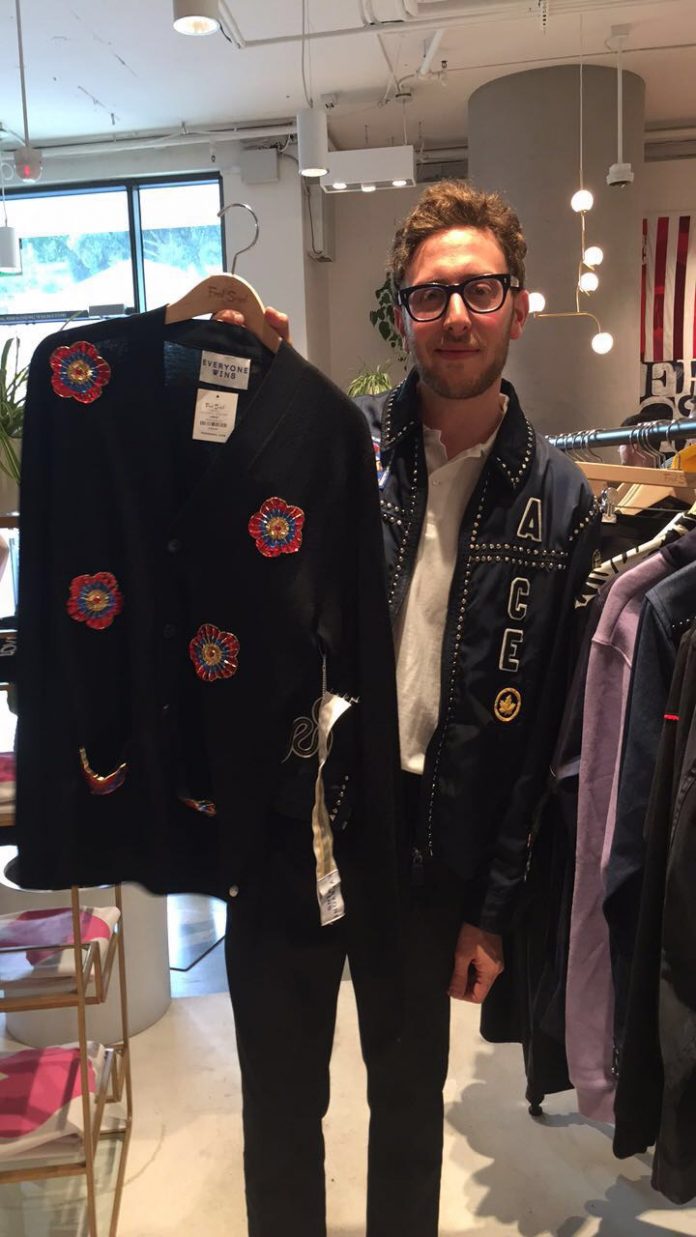The Fred Segal flagship, April 13, 2018
On Friday night Hollywood’s most fashionable crowd turned out for the CFDA celebration of Earth Day at Fred Segal on Sunset Boulevard featuring 7 handpicked sustainable designers. The crowd enjoyed wine and organic appetizers from the Fred Segal café. Customers were excited to check out the exclusive new fashions on display. There were a variety of designers showcasing at the event and each of them had their own definition of sustainability that came through in their unique styles.
A young hip brand called Everyone Wins was particularly eye catching to guests and designer, Alan Eckstein was excited to see his creations come to life in the store. In an exclusive interview with the young creative, Eckstein shared the inspiration behind his one-year old brand made exclusively from recycled vintage clothing. The name is an apt description for what Eckstein describes as his “latest creative experiment” where he hunts down old vintage pieces and combines them to create unique one of a kind items. According to Eckstein he “mixes the old with the new” which is more of a philosophy to live by than a brand for him. He described how satisfying it is to see clothes get a second and third life when a happy customer wears one of his pieces. A true fashion lover Eckstein gushed that he “loves getting into the craft” and eagerly took me through some of his favorite pieces. Eckstein said one of the reasons he loves vintage so much is that the clothes are so well made and meant to last. He told me, “vintage is something I’ve always loved because it’s really the only way I get to wear truly nice pieces in my everyday life”. When I asked him if he had a favorite he immediately pulled out a black cardigan that he explained was one of his first pieces for the collection. Eckstein told me why this piece was so close to his heart saying, “my grandfather owned an embroidery factory in the 50s and these are french” as he pointed to the delicate sparkly appliques he had decoratively placed on the cardigan.
“They’re really high quality and you just don’t see stuff like this anymore” he continued.
“It’s so cool because these were in my mom’s closet and now they’re on a cardigan in Fred Segal” he said, reminding us that recycling isn’t just for junkyards.
Eckstein continued saying that he is a New Yorker at heart but has become very inspired by the Cali culture. He aims to incorporate the “ease and freedom” into his brand because to him it resonates with his vison for Everyone Wins.
Next, I spoke to Christopher, a designer from the brand Nicholas K. which was also featured at the event. Nicholas K. takes a slightly different approach to creating eco-friendly fashion. According to Christopher the brand takes a personal style approach to fashion which Christopher described as a modern urban nomad look. He said they mostly try to stay away from trends. The brand is all about making things that people cherish. “Having less but better things are our philosophy,” said Christopher. He believes that in today’s world the modern customer is always on the move and prizes multi use pieces that can travel well. “We like a casual feeling in terms of how it feels on the body but we like a more sophisticated look. No sweatpants at an event like this. So, we try and create things that feel like sweatpants but look more sophisticated,” he told me. He showed off one of the brands most popular pieces, a grey cape that could be worn two ways.
He said, “This is an iconic piece. I’m all for comfort and this piece is so versatile. That’s the key to sustainability, is creating something that people don’t want to get rid of.”
He described the organic materials they use citing how important it is to find natural fibers. He explained that it takes 3 pounds of chemicals to make synthetic cotton and none to use organic cotton. They even source some fibers locally in their home state of New York. Christopher said they mostly used organic cotton, linen, and Tanguis cotton from Peru. He talked about how it appeals to their customer because people have been slowly becoming more aware of what they are putting on their bodies.
“It was an evolution, first it started with what people were eating, then it moved to beauty and what they were putting on their skin, and now people are starting to think about what they wear,” he said. It also makes practical sense for customers to buy organic materials according to Christopher since dying fibers destroys the fabric making it weaker and more likely to tear due to the high temperatures in dye houses.
Christopher said, “The moment when people realize what a difference it really makes is when they sleep in organic fibers. Al lot of people don’t realize that the leggings and things that are so popular right now are made out of these synthetic fibers. But your sleep will be totally different when you try it and then you can’t go back.”
The brand also stays away from reptile skins and they’ve moved away from exotic furs as well. Christopher said they use a “no waste” approach when deciding on animal materials meaning they don’t use anything that was killed for the sole purpose of fashion.
The brand is also conscious about the labor they outsource wanting to make sure it is eco friendly and ethical. He said they use artisan handmade looms in India for a lot of their work because the industry employs around 10 million rural women in India who often have no other means of income.
The Tanguis cotton they get from Peru also helps to employ rural communities and according to Christopher, using Peruvian cotton is worth it since they grow it 6 times a year compared to the standard single crops found in other places.
Other brands showcasing at the event included Tome, Alabama Chanson, and Yeohlee. According to Victoria Urso, a representative from the CFDA, each brand was chosen for their work with sustainability and all are members of the CFDA.
Urso showed off several different items from the collections. The Alabama Chanson collection was another crowd favorite and according to Urso it’s designed right here in the USA at a local factory in Alabama. The designer uses organic cotton and hand sews many pieces herself as well. This brand creates business locally while also remaining sustainable and stylish.
The event also featured an all-natural perfume brand called Behnaz. The creator uses fresh flower extracts and she told me, “most people think perfume is complicated and made by an expert, but I wanted to make something that was very close to nature, like smelling a bouquet of flowers. It’s a little bit more like wine making.”
These designers were a great reminder that staying eco-conscious comes in all shapes and sizes and any effort helps. The theme of the night seemed to be that no matter what materials you use or what kind of designs you make, it’s important to make clothes that are meant to last. It really can be as easy as Reduce, Reuse, Recycle, Style!

